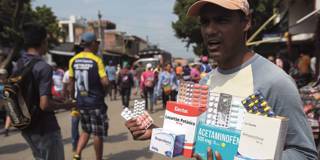Now that COVID-19 has illustrated the destruction that can be wrought by a single virus, there is no longer any excuse for delay in tackling the growing threat posed by antimicrobial resistance. There is still time to prevent a worst-case scenario, but the window is closing fast.
BOSTON – After over a year of pandemic, there is no shortage of “what-if” questions one could pose. What if we had started out with better surveillance and data sharing? What if governments and international health agencies had acted differently? We cannot turn back the clock, but we can and must consider the lessons learned, so that we can apply them to the next great global health challenge: antimicrobial resistance (AMR).

BOSTON – After over a year of pandemic, there is no shortage of “what-if” questions one could pose. What if we had started out with better surveillance and data sharing? What if governments and international health agencies had acted differently? We cannot turn back the clock, but we can and must consider the lessons learned, so that we can apply them to the next great global health challenge: antimicrobial resistance (AMR).